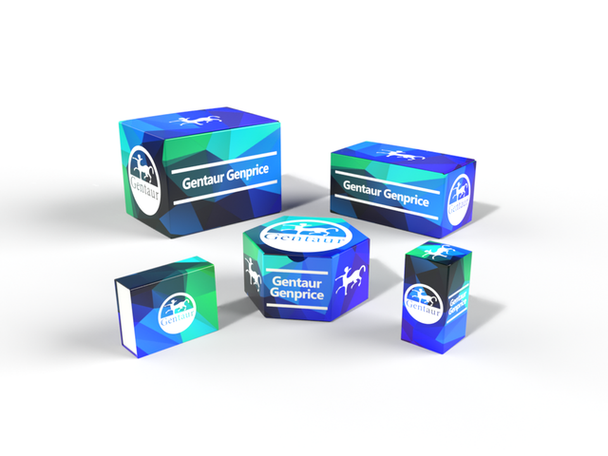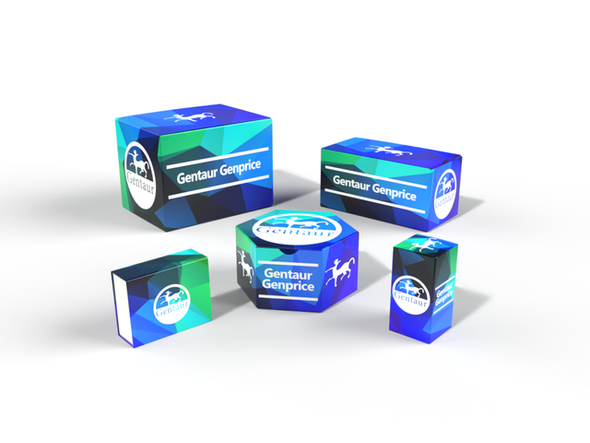749
Human 14-3-3 protein sigma (SFN) ELISA Kit | KTE60683
- SKU:
- 749-KTE60683
- Availability:
- Usually ships in 5 working days
Description
Human 14-3-3 protein sigma (SFN) ELISA Kit | KTE60683 | Gentaur UK, US & Europe Distribution
Application: This Human 14-3-3 protein sigma (SFN) ELISA Kit employs a two-site sandwich ELISA to quantitate SFN in samples. An antibody specific for SFN has been pre-coated onto a microplate. Standards and samples are pipetted into the wells and anySFN present is bound by the immobilized antibody. After removing any unbound substances, a biotin-conjugated antibody specific for SFN is added to the wells. After washing, Streptavidin conjugated Horseradish Peroxidase (HRP) is added to the wells. Following a wash to remove any unbound avidin-enzyme reagent, a substrate solution is added to the wells and color develops in proportion to the amount of SFN bound in the initial step. The color development is stopped and the intensity of the color is measured.
Detection Method: Colorimetric
Conjugate: N/A
Sample Type: Cell culture supernatants#Serum#Plasma#Other biological fluids
Assay Type: Multiple steps standard sandwich ELISA assay with a working time of 3-5 hours. It depends on the experience of the operation person.
Kit Component: • Human 14-3-3 protein sigma microplate
• Human 14-3-3 protein sigma standard
• Human 14-3-3 protein sigma detect antibody
• Streptavidin-HRP
• Standard diluent
• Assay buffer
• HRP substrate
• Stop solution
• Wash buffer
• Plate covers
Features & Benefits: Human 14-3-3 protein sigma (SFN) ELISA Kit has high sensitivity and excellent specificity for detection of Human SFN. No significant cross-reactivity or interference between Human SFN and analogues was observed.
Calibration Range: Please inquire
Limit Of Detection: Please inquire
Usage Note: • Do not mix components from different kit lots or use reagents beyond the kit expiration date.
• Allow all reagents to warm to room temperature for at least 30 minutes before opening.
• Pre-rinse the pipet tip with reagent, use fresh pipet tips for each sample, standard and reagent to avoid contamination.
• Unused wells must be kept desiccated at 4 °C in the sealed bag provided.
• Mix Thoroughly is very important for the result. It is recommended using low frequency oscillator or slight hand shaking every 10 minutes.
• It is recommended that all samples and standards be assayed in duplicate or triplicate.
Storage Instruction: The unopened kit should be stored at 2 - 8°C. After opening, please store refer to protocols.
Shipping: Gel pack with blue ice.
Precaution The product listed herein is for research use only and is not intended for use in human or clinical diagnosis. Suggested applications of our products are not recommendations to use our products in violation of any patent or as a license. We cannot be responsible for patent infringements or other violations that may occur with the use of this product.
Background: Stratifin, was shown to be diffusely distributed in the cytoplasm and was present in cultured epithelial cells. It was most abundant in tissues enriched in stratified keratinizing epithelium.The induction of 14-3-3-sigma is mediated by a p53 -responsive element located 1.8 kb upstream of its transcription start site. Exogenous introduction of 14-3-3-sigma into cycling cells results in a G2 arrest. After DNA damage, these cells initially arrested in the G2 phase of the cell cycle, but unlike cells containing 14-3-3-sigma, the 14-3-3-sigma -/- cells were unable to maintain cell cycle arrest. The 14-3-3-sigma -/- cells died (mitotic catastrophe) as they entered mitosis. This process was associated with a failure of the 14-3-3-sigma-deficient cells to sequester the proteins that initiate mitosis and prevent them from entering the nucleus.
Alternative Names: SFN; YWHAS; 14-3-3 sigma
Search name: SFN; YWHAS; 14-3-3 sigma
Tag: SFN






